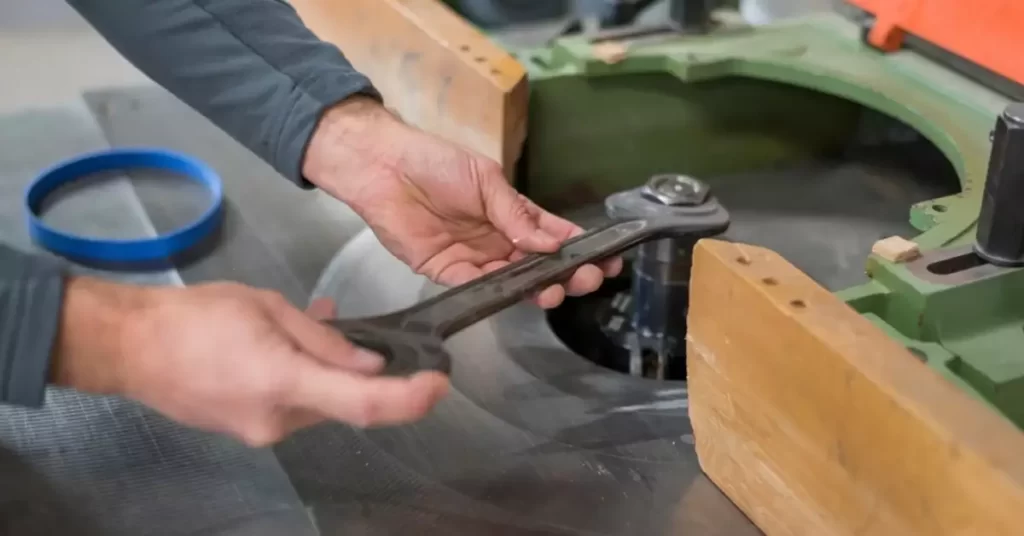Spanning a multitude of applications, wrenches have become indispensable tools in our daily lives. With their diverse uses, it’s no surprise that the steel types used in their manufacturing must live up to stringent standards.
Let’s dive into the fascinating world of steel and discover the different types of steel used in creating wrenches, their properties, and how they impact the tool’s performance.
Types of Steel Used in Wrenches
Carbon Steel
Carbon steel, which consists primarily of iron and carbon, is the most common type of steel used in wrench manufacturing. The carbon content affects the steel’s strength, hardness, and ductility.
Wrenches made from carbon steel are affordable and offer decent performance, but they may lack the durability and corrosion resistance of other steel types.
Chrome Vanadium Steel
Chrome vanadium steel is a popular choice for making wrenches due to its excellent strength, toughness, and wear resistance.
This alloy steel contains chromium and vanadium, which significantly improve the material’s properties. Chrome vanadium wrenches are ideal for heavy-duty applications and can withstand high torque forces.
Chrome Molybdenum Steel
Another alloy steel commonly used in wrench production is chrome molybdenum steel. This material contains chromium and molybdenum, offering high strength and toughness along with excellent resistance to wear and corrosion.
Chrome molybdenum wrenches are typically lighter and more durable than other types, making them suitable for professional use.
Stainless Steel
Although less common in wrench manufacturing, stainless steel offers exceptional corrosion resistance, making it an ideal choice for use in harsh environments or applications where rust prevention is crucial. Stainless steel wrenches are often more expensive and less durable than other types of steel wrenches.

Properties of Steel Types
Strength
The strength of a wrench is crucial, as it determines the amount of torque it can handle without deforming or breaking. Alloy steels like chrome vanadium and chrome molybdenum are preferred for their high strength properties.
Hardness
Hardness is the measure of a material’s resistance to wear and abrasion. Harder steels typically offer longer service life and better performance. Chrome vanadium and chrome molybdenum steels are known for their hardness, making them suitable for heavy-duty applications.
Corrosion Resistance
Corrosion resistance is essential in prolonging the lifespan of a wrench. Stainless steel provides the best corrosion resistance, while carbon steel is prone to rust without proper care.
Alloy steels like chrome vanadium and chrome molybdenum offer moderate corrosion resistance, which can be further improved with appropriate coatings and finishes.
Ductility and Toughness
Ductility refers to a material’s ability to deform without breaking, while toughness measures its ability to absorb energy and resist fracture.
These properties are essential in wrenches to prevent failure during use. Chrome vanadium and chrome molybdenum steels are known for their excellent ductility and toughness, ensuring long-lasting performance.
Heat Treatment Processes
Hardening
Hardening is a heat treatment process used to increase the hardness and strength of steel. This process involves heating the steel to a specific temperature, followed by rapid cooling, usually through quenching in oil or water.
The hardening process is commonly used in the manufacturing of wrenches to enhance their durability and performance.
Tempering
After hardening, steel is often brittle and prone to cracking. Tempering is a heat treatment process that involves heating the hardened steel to a lower temperature and then allowing it to cool slowly. This process reduces the steel’s brittleness, improving its toughness and making it suitable for use in wrenches.
Annealing
Annealing is another heat treatment process used to improve the ductility and machinability of steel. During annealing, the steel is heated to a specific temperature and then allowed to cool slowly.
This process is often used in the initial stages of wrench manufacturing to prepare the steel for subsequent shaping and forming processes.
Coatings and Finishes
Chrome Plating
Chrome plating is a popular finish for wrenches, as it enhances the tool’s appearance and provides a layer of corrosion protection.
The process involves electroplating a thin layer of chromium onto the steel surface. Chrome-plated wrenches are easy to clean and maintain, offering improved durability and longevity.
Black Oxide
Black oxide is another common finish for wrenches. It provides a matte black appearance and offers moderate corrosion resistance.
The black oxide process involves a chemical reaction that forms a thin layer of black iron oxide on the steel surface. Although less durable than chrome plating, black oxide is an affordable and functional finish option.
Phosphate Coating
Phosphate coatings are applied to steel surfaces to provide corrosion protection and improved wear resistance. The process involves immersing the steel in a phosphating solution, which forms a thin layer of insoluble phosphate crystals on the surface.
Phosphate-coated wrenches are durable and offer a non-reflective appearance, making them ideal for professional use.
Factors to Consider When Choosing a Wrench
Purpose and Use
Consider the specific application and environment in which the wrench will be used. For heavy-duty applications or professional use, opt for wrenches made from chrome vanadium or chrome molybdenum steel. For corrosion resistance, consider stainless steel or wrenches with appropriate coatings.
Durability
Choose a wrench made from high-quality steel and featuring a suitable coating or finish to ensure long-lasting performance and resistance to wear, corrosion, and damage.
Price
While higher-priced wrenches may offer better performance and durability, consider your budget and the frequency of use when selecting a wrench. In some cases, an affordable carbon steel wrench may suffice for occasional or light-duty use.
Maintenance Requirements
Consider the maintenance requirements of different steel types and finishes. Chrome-plated wrenches are easy to clean and maintain, while black oxide and phosphate-coated wrenches may require more frequent cleaning and lubrication to prevent rust and corrosion.
The Manufacturing Process of Wrenches
The manufacturing process of wrenches typically involves the following steps:
- Raw material selection (steel)
- Annealing (if required)
- Cutting and shaping (forging or machining)
- Heat treatment (hardening and tempering)
- Finishing (grinding and polishing)
- 6. Coating or plating (chrome, black oxide, phosphate)
- Quality control and inspection
Each step is crucial in ensuring the final product meets the desired quality standards and performs as expected during use.
The Impact of Steel Type on Wrench Performance
The choice of steel used in wrench manufacturing significantly affects the tool’s performance, durability, and overall lifespan.
High-quality alloy steels, such as chrome vanadium and chrome molybdenum, offer excellent strength, hardness, and resistance to wear and corrosion, making them ideal for heavy-duty applications and professional use.
On the other hand, carbon steel wrenches are more affordable but may lack the durability and corrosion resistance necessary for long-term use in demanding environments.
Popular Wrench Brands and Their Steel Choices
Some well-known wrench brands and the types of steel they typically use in their products include:
- Snap-on: Chrome vanadium and chrome molybdenum steel
- Craftsman: Carbon steel and chrome vanadium steel
- GearWrench: Chrome vanadium steel
- Proto: Chrome vanadium and chrome molybdenum steel
- Klein Tools: Carbon steel and chrome vanadium steel
Each brand offers various wrench models and options to cater to different user preferences, budgets, and specific applications.
FAQs
Why are some wrenches heavier than others?
Wrench weight can vary depending on the type of steel used, the manufacturing process, and the overall design of the tool. Chrome molybdenum wrenches, for example, are typically lighter than those made from chrome vanadium steel.
Can I use a stainless steel wrench for heavy-duty applications?
Although stainless steel wrenches offer excellent corrosion resistance, they may not be as durable or strong as those made from alloy steels like chrome vanadium or chrome molybdenum. It’s best to use stainless steel wrenches in applications where corrosion resistance is a priority.
How do I maintain and care for my wrenches?
Regular cleaning, inspection, and lubrication are essential for maintaining the performance and longevity of your wrenches.
Clean your wrenches with a soft cloth or brush and mild detergent, then apply a light coat of oil or rust inhibitor to protect the tool from corrosion. Store your wrenches in a dry, well-ventilated area, and avoid exposing them to extreme temperatures or humidity.
Final Verdict
Understanding the types of steel used in wrench manufacturing and their unique properties is essential when selecting the right tool for your needs.
Chrome vanadium and chrome molybdenum steels offer exceptional strength, hardness, and durability, making them ideal choices for heavy-duty applications and professional use.
Carbon steel wrenches are affordable and suitable for light-duty tasks, while stainless steel wrenches provide excellent corrosion resistance for specialized applications.
By considering factors like the tool’s purpose, durability, price, and maintenance requirements, you can make an informed decision and choose the best wrench for your specific needs.
